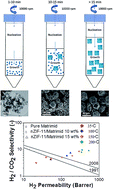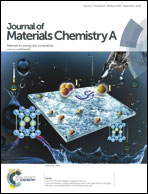Beyond the H2/CO2 upper bound: one-step crystallization and separation of nano-sized ZIF-11 by centrifugation and its application in mixed matrix membranes†
Abstract
The synthesis of nano-sized ZIF-11 with an average size of 36 ± 6 nm is reported. This material has been named nano-zeolitic imidazolate framework-11 (nZIF-11). It has the same chemical composition and thermal stability and analogous H2 and CO2 adsorption properties to the conventional microcrystalline ZIF-11 (i.e. 1.9 ± 0.9 μm). nZIF-11 has been obtained following the centrifugation route, typically used for solid separation, as a fast new technique (pioneering for MOFs) for obtaining nanomaterials where the temperature, time and rotation speed can easily be controlled. Compared to the traditional synthesis consisting of stirring + separation, the reaction time was lowered from several hours to a few minutes when using this centrifugation synthesis technique. Employing the same reaction time (2, 5 or 10 min), micro-sized ZIF-11 was obtained using the traditional synthesis while nano-scale ZIF-11 was achieved only by using centrifugation synthesis. The small particle size obtained for nZIF-11 allowed the use of the wet MOF sample as a colloidal suspension stable in chloroform. This helped to prepare mixed matrix membranes (MMMs) by direct addition of the membrane polymer (polyimide Matrimid®) to the colloidal suspension, avoiding particle agglomeration resulting from drying. The MMMs were tested for H2/CO2 separation, improving the pure polymer membrane performance, with permeation values of 95.9 Barrer of H2 and a H2/CO2 separation selectivity of 4.4 at 35 °C. When measured at 200 °C, these values increased to 535 Barrer and 9.1.


 Please wait while we load your content...
Please wait while we load your content...